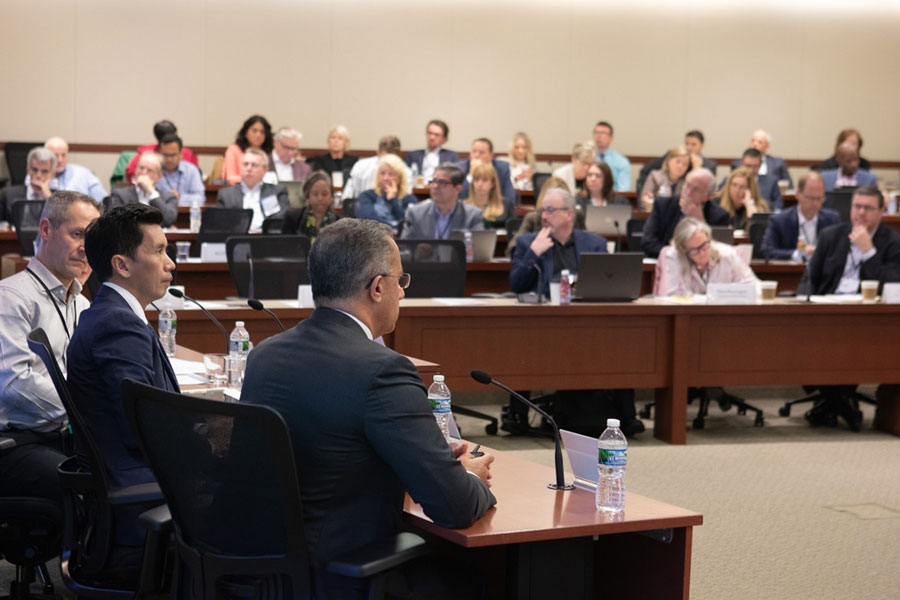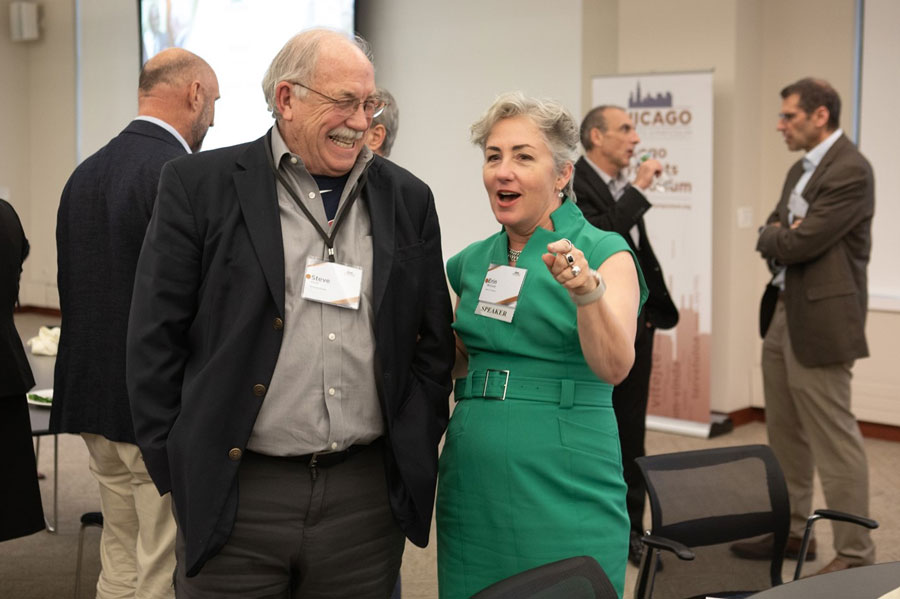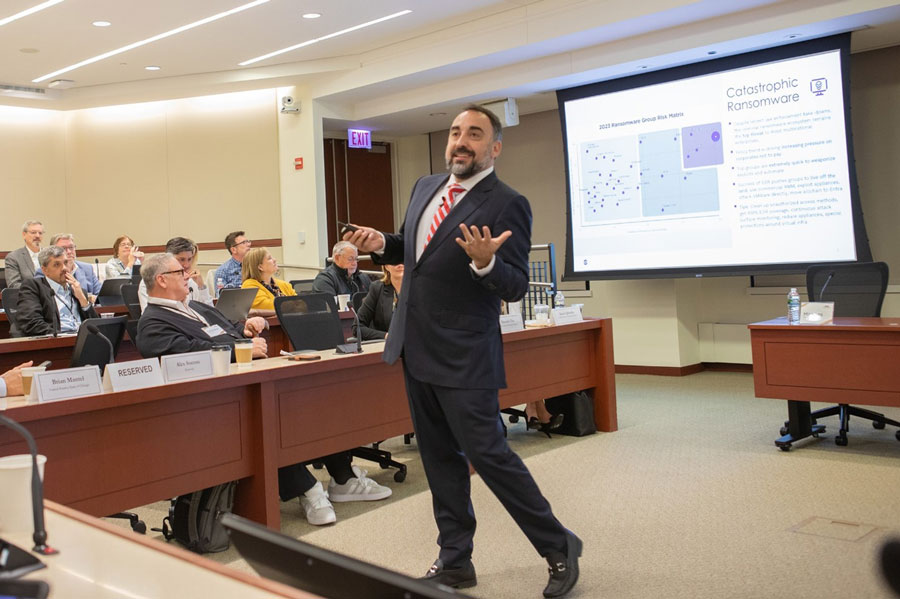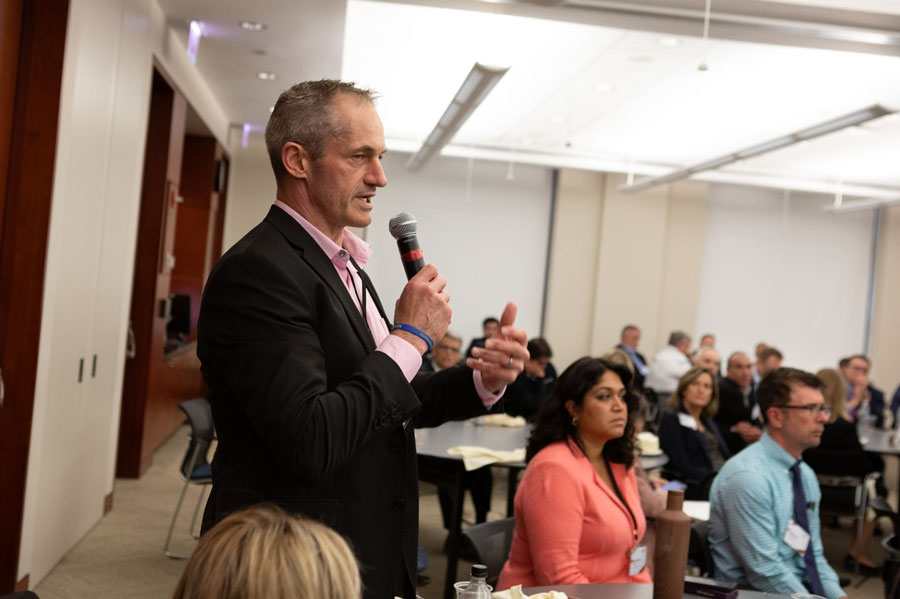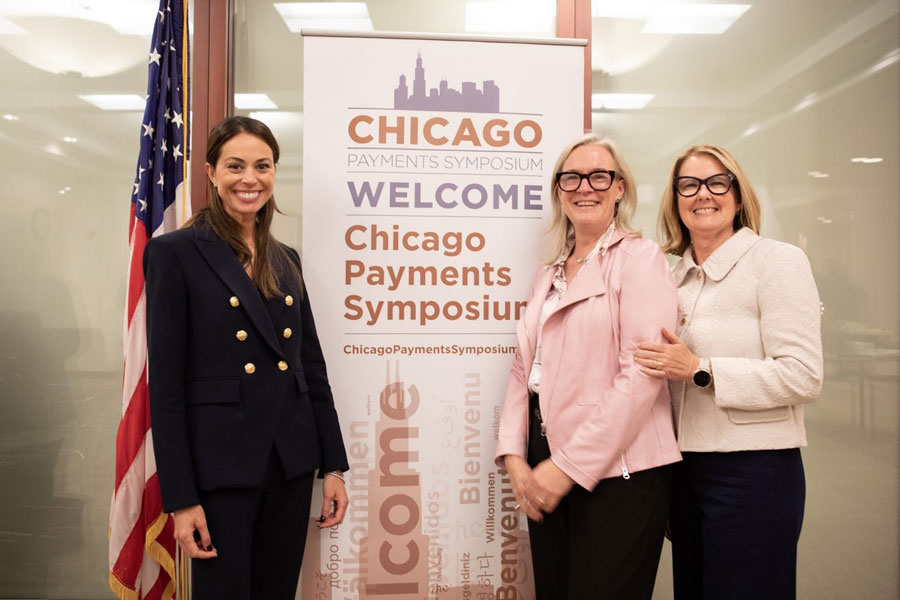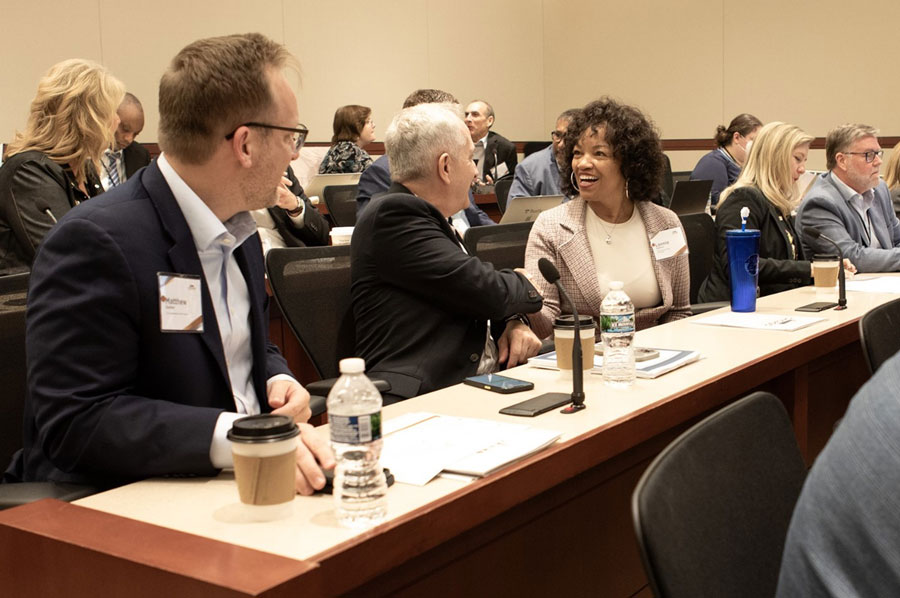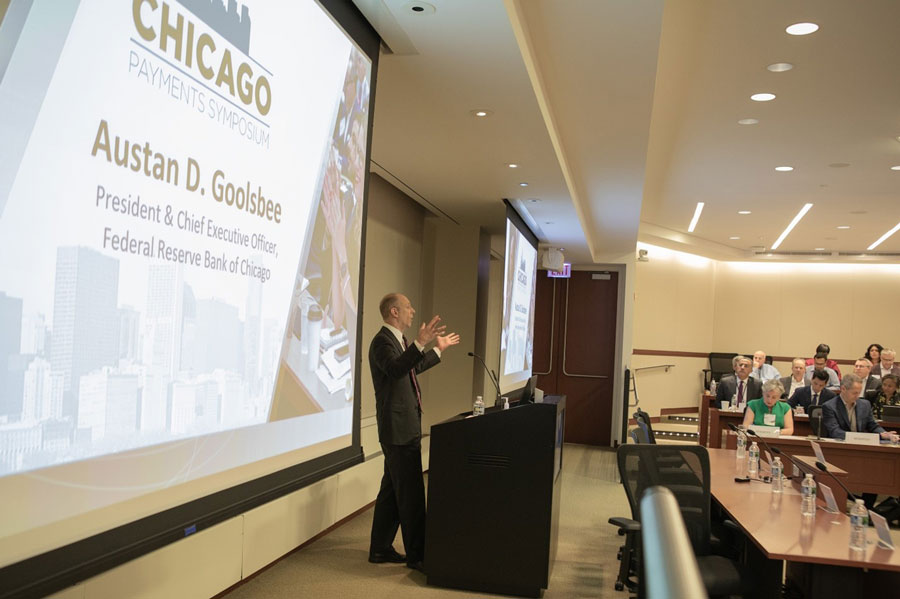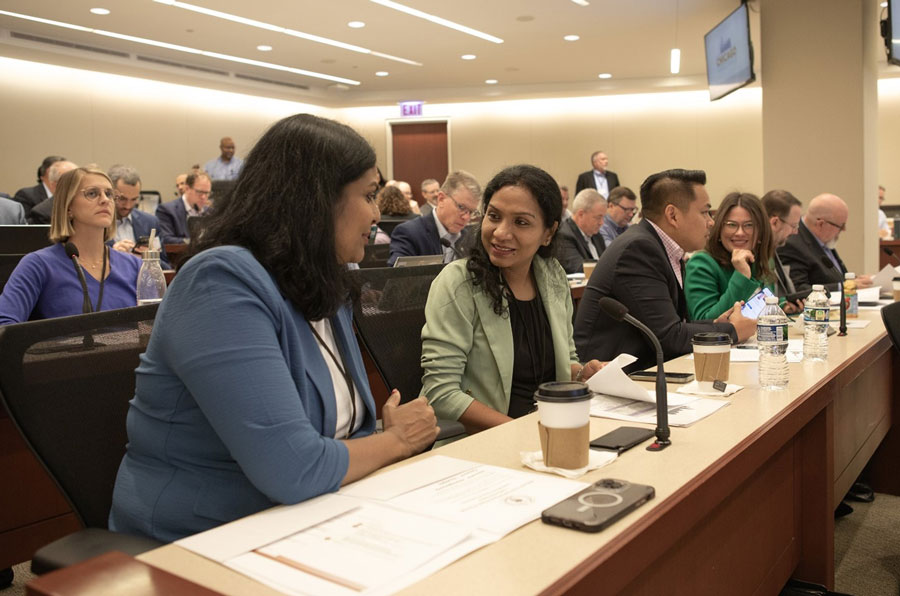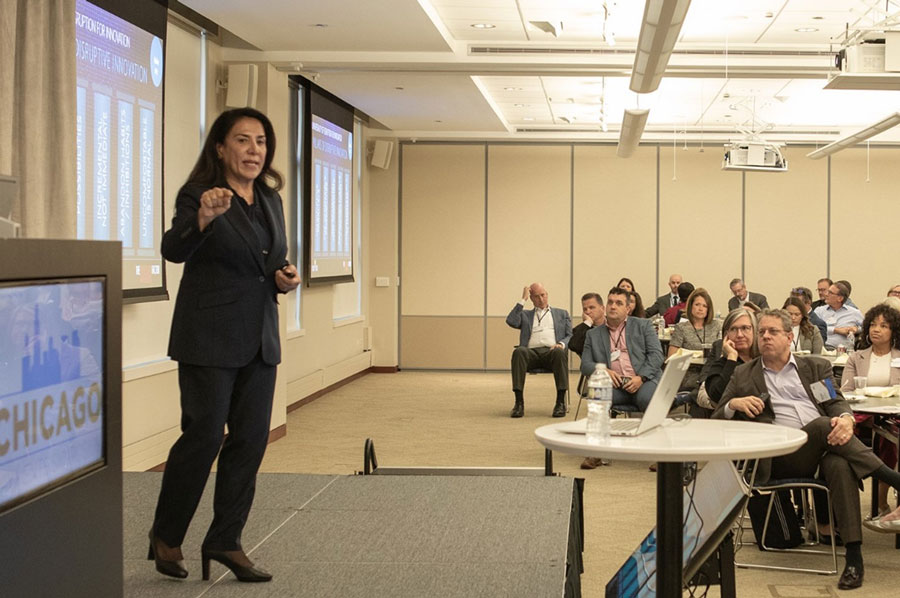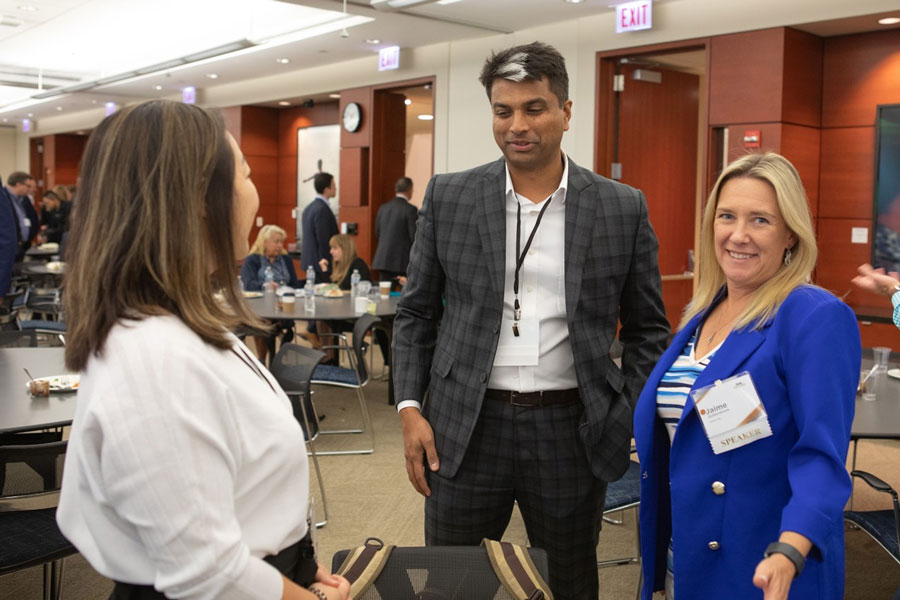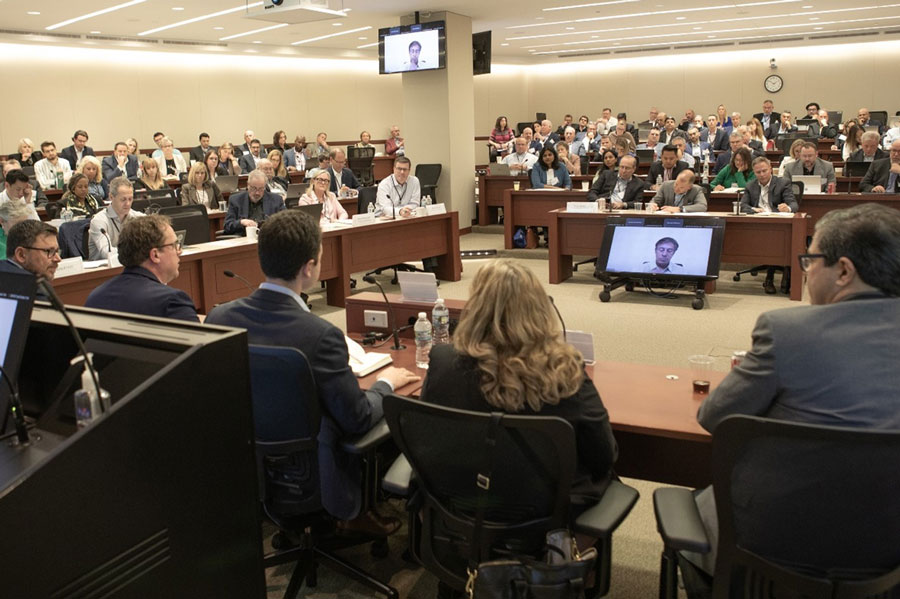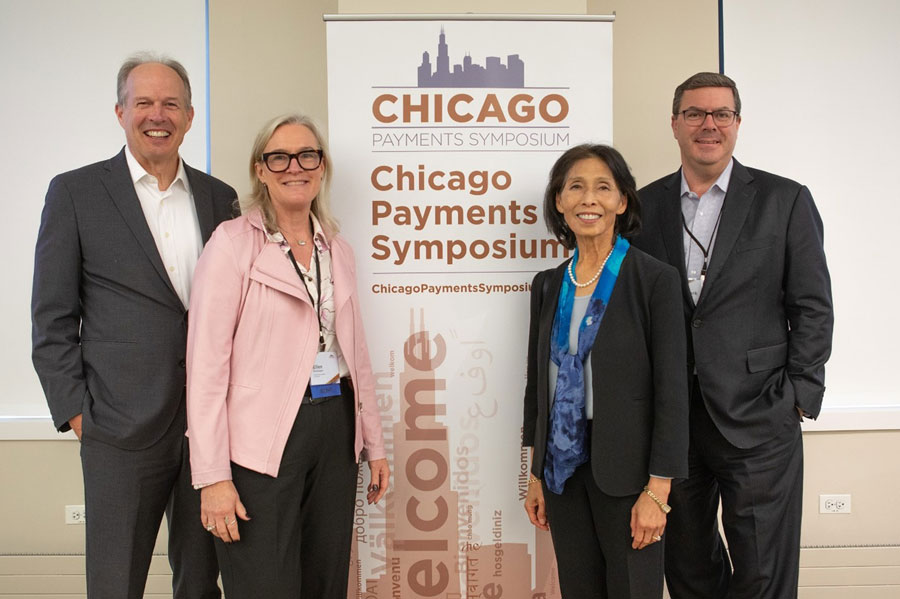This year’s Chicago Payments Symposium focused on three key industry themes – innovation, security and adaptability – based on current and evolving trends in innovation, instant payments, global payments, digital currencies, security and information sharing. Payments leaders gathered in person and virtually to share insights, hear thought-provoking sessions, participate in strategic conversations, and simply enjoy networking with their peers.
During the two-day sessions, Symposium speakers and attendees discussed the foundational work that is being done, and still is needed, to advance the security and resiliency of our global payment infrastructures.
“Cross-industry collaboration helps us make critical changes in the payments space,” said Austan Goolsbee, president and chief executive officer of the Federal Reserve Bank of Chicago, who kicked off the event. “This kind of collaboration has been a hallmark of the Chicago Payments Symposium, providing a place to discuss issues of the moment and mobilize for the future. Now, we are currently witnessing the most significant upgrade in payments infrastructure in four decades. Across the globe, the payments industry is rising to meet changing consumer and business needs, like offering 24 hour-a-day, 365-days-a-year service.”
Click the arrows on the side of each graphic to navigate through the photo gallery.
Highlights of the event’s sessions included:
- Keynote address on innovation. Linda Bernardi, author, entrepreneur and former IBM chief innovation officer, advised the audience to “rethink, reimagine and reset your mindset” and “trust your instincts” to encourage innovation at your organization, whether it is large or small. It’s human nature to worry about taking risks, she said, and fear can cause people to resist change and innovation. “What if?’ is a powerful way to counteract this fearful tendency. Bernardi discussed several examples of companies that succeeded beyond expectations by asking themselves this question, which helped them achieve extraordinary customer-centric results and embrace technological disruption – whether that is cloud computing or artificial intelligence (AI). Bernardi believes more widespread use of AI is an “inevitability” as the world struggles to manage and make sense of the massive, and exponentially increasing, amount of data it generates each day.
- Keynote on cybersecurity. “Cyber is cheap. Sometimes, all [bad actors] need is a 17-year-old and a laptop,” warned Alex Stamos, chief information security officer (CISO) of SentinelOne and former CISO of Facebook. He cited the RSA malware attack (Off-site) that affected tens of millions of users in government and military agencies, defense contractors and others as an example of how nations are shifting their focus away from intellectual property theft to cyber breaches that offer military benefits. Criminals increasingly employ ransomware because they can use bitcoin to move ransom payments quickly – “and you can’t get it back.” Stamos warned the audience to employ multiple layers of security defenses; pay more attention to cleaning up potential avenues for unauthorized access to their systems, such as unpatched third-party appliances (Off-site) used for network management; and embrace some friction, which can allow companies more time to detect and respond to cyberthreats.
- Keynote on adaptability and regulation of domestic payments. The U.S. Department of the Treasury is leading critical interagency work on the future of payments and money as technology risks and market factors change, causing the payments industry to improve and evolve. These new payments technologies include tokenization based on distributed ledger technologies, or DLT, according to Nellie Liang, Treasury’s Under Secretary for Domestic Finance. Liang also discussed (Off-site) how the rules of the road could evolve to better support safe, effective and thoughtful payments innovation. Liang called for state and federal regulators to develop a “modern” regulatory framework for nonbank payment service providers, principally for issuers of e-money. She said this should include “consistent reserve requirements and being able to intervene immediately in a crisis to ensure trust and continuity of services.”
“Looking back, it is both incredible how far the industry has come and gratifying to see how many themes discussed at the Symposium five or 10 years ago are now playing out in real time – for example, next-generation payments.”
Austan Goolsbee, president and CEO
Federal Reserve Bank of Chicago
- Evolution of instant payments. Moderator and FedNow® Service business executive Nick Stanescu began the session with a deep dive into the status of instant payments in the U.S., including the FedNow Service’s recent milestone of 1,000+ participants (up from 35 financial institutions since its July 2023 launch) and 35 service providers (more than double the count at launch). Stanescu asked panelists from Conduent, Fiserv, Matera, Modern Treasury and Velera to discuss tailwinds, headwinds and goals for instant payments over the next three years.
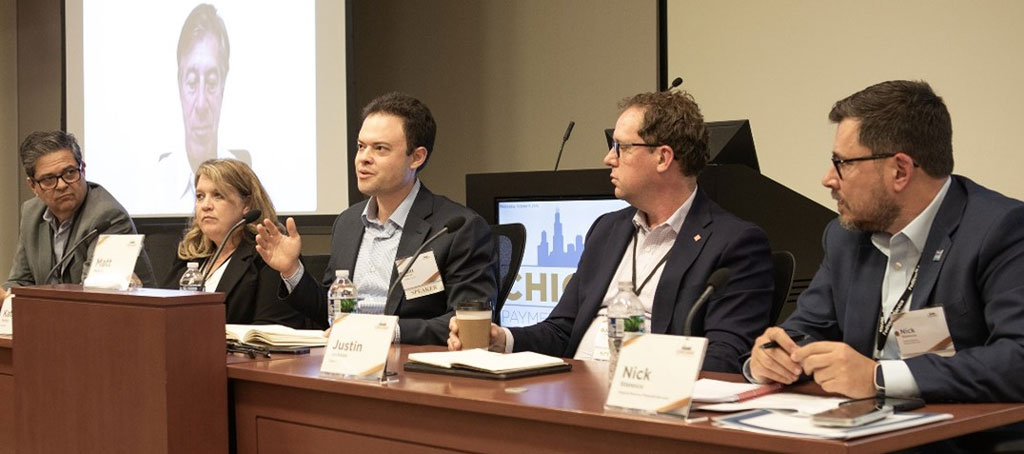 Panelists aligned on the importance of nationwide reach, ubiquity, fraud and risk management tools; the benefits for many financial institutions of trying out “receive only” before expanding to “send” functionality; and rising demand from various use cases, such as food delivery and real estate escrow payments as explored by the U.S. Faster Payments Council’s just-released study: Instant Payments Adoption Outlook: Quantitative Survey of U.S. Financial Institution Enablers (Off-site). To further promote faster payments adoption, a work group of the U.S. Faster Payments Council published Directory Models in the U.S. (Off-site) earlier this year.
Panelists aligned on the importance of nationwide reach, ubiquity, fraud and risk management tools; the benefits for many financial institutions of trying out “receive only” before expanding to “send” functionality; and rising demand from various use cases, such as food delivery and real estate escrow payments as explored by the U.S. Faster Payments Council’s just-released study: Instant Payments Adoption Outlook: Quantitative Survey of U.S. Financial Institution Enablers (Off-site). To further promote faster payments adoption, a work group of the U.S. Faster Payments Council published Directory Models in the U.S. (Off-site) earlier this year. - Scams, security and information sharing. Moderator Liz Buser of AARP led panelists from the American Bankers Association, Federal Reserve Financial Services, LexisNexis® Risk Solutions and Somos in exploring scam and fraud trends, including historic threats (check fraud, account takeovers), emerging threats (e.g., synthetic identity fraud) and future threats of concern (e.g., generative artificial intelligence “deepfakes”). Global scam losses are growing particularly strongly – up 25% in 2023 versus 2022 – as digitalization, ecommerce and telecommunications vulnerabilities have lowered criminals’ geographic barriers.
 Given the rising prevalence of consumer fraud, AARP offers resources that include the AARP Fraud Watch NetworkTM (Off-site), a fraud helpline (Off-site) and fraud victim support group (Off-site). Throughout the discussion, the value of education, information sharing, collaborative tools, and having multiple anti-fraud signals and solutions were agreed on. Examples the panelists cited include the joint American Bankers Association-U.S. Postal Inspection Service public awareness campaign (Off-site) to combat check fraud; Federal Reserve-led work groups that led to an information sharing report, the ScamClassifierSM model and FraudClassifierSM model; and certain information sharing benefits of Section 222(d) of the Telecommunications Act of 1996.
Given the rising prevalence of consumer fraud, AARP offers resources that include the AARP Fraud Watch NetworkTM (Off-site), a fraud helpline (Off-site) and fraud victim support group (Off-site). Throughout the discussion, the value of education, information sharing, collaborative tools, and having multiple anti-fraud signals and solutions were agreed on. Examples the panelists cited include the joint American Bankers Association-U.S. Postal Inspection Service public awareness campaign (Off-site) to combat check fraud; Federal Reserve-led work groups that led to an information sharing report, the ScamClassifierSM model and FraudClassifierSM model; and certain information sharing benefits of Section 222(d) of the Telecommunications Act of 1996. - Innovation on top of current payment rails. Moderator Eric Schurr of Sunrise Banks raised the following questions: How do we develop an innovation mindset? Are we solving the right problems to improve the user experience and help people manage their lives with banking and payment technologies? How can innovation advance core financial wellness?
 Panelists from the Innovative Payments Association, Payfinia (a Tyfone company), Trustly and Walmart joined Schurr in discussing the opportunities and challenges of open banking (the process that enables consumers to share their financial information through third-party applications), digital banking, ACH, retail and instant payments. Innovation in these areas has been an “iterative process,” with banking and fintech advancements building on earlier improvements in security and fraud controls, request for payment and workflow automation, among others. The panel also discussed opportunities to facilitate faster payments by standardizing QR codes to foster ubiquity across networks, building on work by the U.S. Faster Payments Council (Off-site) and others.
Panelists from the Innovative Payments Association, Payfinia (a Tyfone company), Trustly and Walmart joined Schurr in discussing the opportunities and challenges of open banking (the process that enables consumers to share their financial information through third-party applications), digital banking, ACH, retail and instant payments. Innovation in these areas has been an “iterative process,” with banking and fintech advancements building on earlier improvements in security and fraud controls, request for payment and workflow automation, among others. The panel also discussed opportunities to facilitate faster payments by standardizing QR codes to foster ubiquity across networks, building on work by the U.S. Faster Payments Council (Off-site) and others. - Digital currency, digital assets and settlement. Moderator Matthew Blumenfeld of PwC United States joined panelists from Deutsche Bundesbank, Onyx and Rutgers Law School in examining the current state of digital currency, stablecoins (digital private money backed by a reference asset), and central bank digital currencies (CBDCs), a form of digital currency that have a value fixed and is equivalent to fiat currency. Public (fiat) and private digital currencies coexist and/or are being explored. While cumulative market capitalization of some cryptocurrencies now rivals some fiat currencies, some digital assets are better suited to act as “money” than others.
 Developments continue to build momentum. For example, the European Central Bank is conducting “experiments” through 2025 to help prepare for an eventual European Union decision about whether to issue a digital euro. Digital currency benefits can include programmability, enabling new cases, faster processing and settlement of cross-border and other payments, as well as financial inclusion (e.g., facilitating migrants’ remittance payments). Key trends include regulatory evolution; tokenization; and exploring linkages between digital currencies, digital assets and traditional payment rails, such as the TIPS Hash-Link solution (Off-site) to facilitate interoperability between a generic market DLT platform and a payment system. The panel highlighted the significant amount of learning that has occurred in just the last several years.
Developments continue to build momentum. For example, the European Central Bank is conducting “experiments” through 2025 to help prepare for an eventual European Union decision about whether to issue a digital euro. Digital currency benefits can include programmability, enabling new cases, faster processing and settlement of cross-border and other payments, as well as financial inclusion (e.g., facilitating migrants’ remittance payments). Key trends include regulatory evolution; tokenization; and exploring linkages between digital currencies, digital assets and traditional payment rails, such as the TIPS Hash-Link solution (Off-site) to facilitate interoperability between a generic market DLT platform and a payment system. The panel highlighted the significant amount of learning that has occurred in just the last several years. - Global payments. Representatives of varied countries, perspectives and progress discussed improving global payments – but agreed on key points, such as the importance of innovation, linking fast payment systems with each other, and improving interoperability, cross-border payments, resiliency, access, functionality and security.
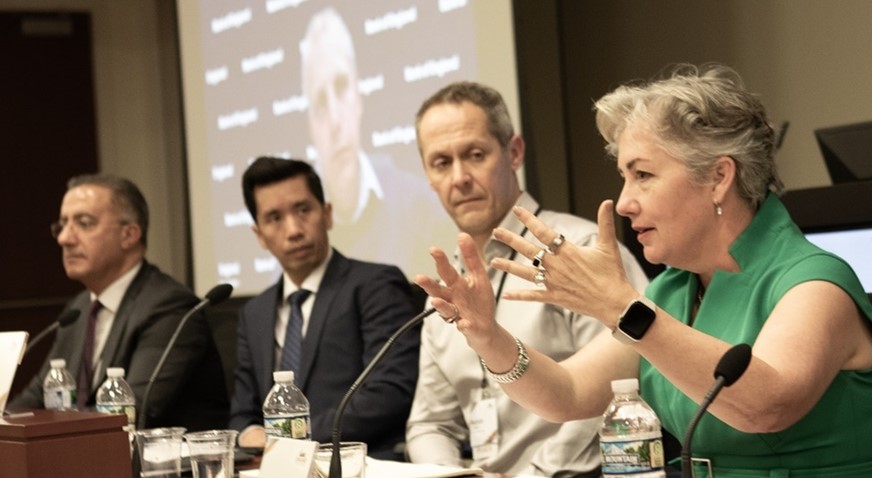 During the session, panelists from Australia, Thailand, the United Arab Emirates and Bank of England spoke on the status of global payments in their respective countries, including Australian Payments Plus (AP+); UAE’s Buna cross-border solution; England’s real-time gross settlement service renewal program; and Thailand’s PromptPay, which links to Singapore’s PayNow service and is now supporting work for multilateral linkages to multiple other countries. Moderator Erin McCune of Bain & Co. asked follow-up questions on issues and technologies that affect multiple countries, such as account verification, confirmation of payee, QR codes and “harmonizing” ISO® 20022.
During the session, panelists from Australia, Thailand, the United Arab Emirates and Bank of England spoke on the status of global payments in their respective countries, including Australian Payments Plus (AP+); UAE’s Buna cross-border solution; England’s real-time gross settlement service renewal program; and Thailand’s PromptPay, which links to Singapore’s PayNow service and is now supporting work for multilateral linkages to multiple other countries. Moderator Erin McCune of Bain & Co. asked follow-up questions on issues and technologies that affect multiple countries, such as account verification, confirmation of payee, QR codes and “harmonizing” ISO® 20022.
Visit the 2024 Chicago Payments Symposium agenda (Off-site) to learn more about the event.
The views and opinions expressed in this program do not necessarily reflect the views or positions of the Federal Reserve System.

